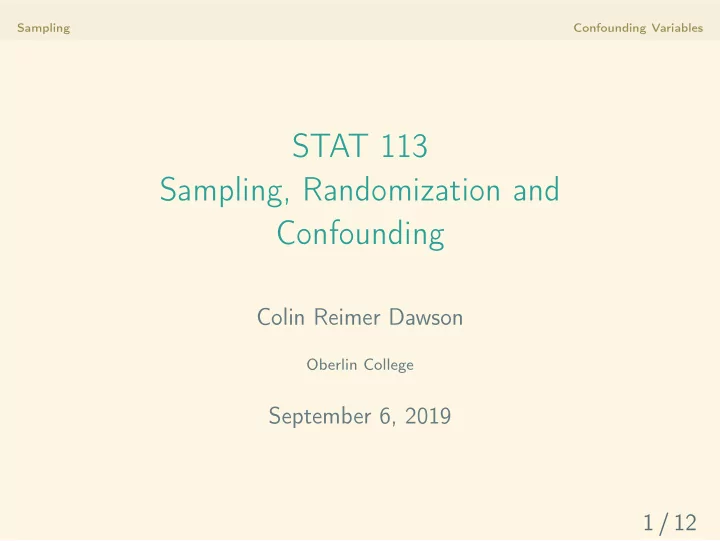

Sampling Confounding Variables STAT 113 Sampling, Randomization and Confounding Colin Reimer Dawson Oberlin College September 6, 2019 1 / 12
Sampling Confounding Variables Sampling and Inference: The “Big Picture” 3 / 12
Sampling Confounding Variables Population, Samples, and Inference Population: All potential cases that we are interested in saying something about Sample: The set of cases we actually have data for (a subset of the population) Statistical Inference: Using sample data to obtain information about the population For inference to be effective, samples ought to be representative of the population. 4 / 12
Sampling Confounding Variables Simple Random Sampling • To guard against sampling bias, we typically want to collect a random sample. Versions... • Simple Random Sampling • Stratified Sampling • Cluster Sampling • Systematic Sampling 5 / 12
Sampling Confounding Variables Feasibility of Random Sampling It is often not feasible to get a truly random sample. Options: • Sample from a subset of the population; generalize conservatively • Collect a non-random sample, avoid bias related to variables of interest 6 / 12
Sampling Confounding Variables Not all Non-Random Samples are Created Equal You want to estimate the average hours per week that Oberlin students spend studying. None of the following is random; which would you go with? (a) Go to Mudd and use a RNG to select people to ask (b) Email every student and use all responses (c) Require all students in a random statistics class to respond (d) Go to the gym and ask everyone going in (e) Stand outside The Local and ask every fifth person entering 7 / 12
Sampling Confounding Variables Not all Non-Random Samples are Created Equal None of the above are representative in every way, but some are more obviously non-representative for the variable we care about . Sampling Bias is a problem when the chance a case has of being selected is associated with one or more of the variables being collected. 8 / 12
Sampling Confounding Variables “Don’t Ask Don’t Tell” 2010 CBS/NYT polls (when DADT was being reconsidered): “Do you favor or oppose homosexuals gay men and lesbians serving openly in the military?” Favor Oppose “homosexuals” 44% 42% “gay men and lesbians” 58% 28% 9 / 12
Sampling Confounding Variables Non-Sampling Bias Other sources of bias not due to sampling procedure • Question wording • Non-response bias • Context 10 / 12
Sampling Confounding Variables Handout: Sell-Out Crowds and Home Team Wins 12 / 12
Recommend
More recommend